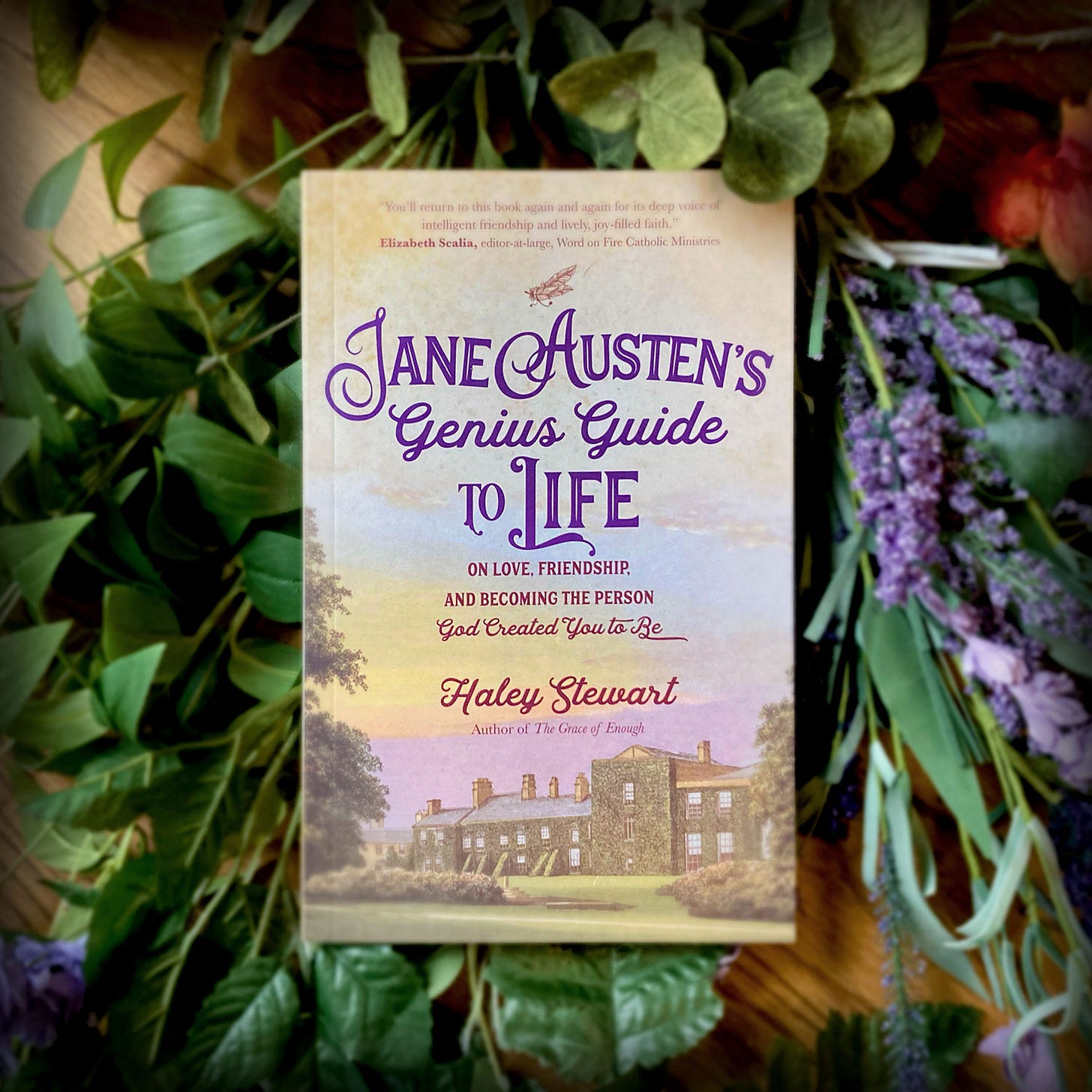If you’re new to this Substack, one of the things I’m offering subscribers in 2023 is A Year with Jane. We’re reading through Austen’s six novels this year and Mansfield Park is our read for May and June.
This is a reader-supported publication. To receive new posts and support my work, consider becoming a free or paid subscriber.
My goal is always to send the weekly Austen reflection on Sunday, but this week we were preparing for a newly-minted 10-year-old’s birthday party. I am catching up!
Chapters 10-18
In last week’s reading of Mansfield Park, we met Mr. Yates, the oldest Bertram brother’s friend. Yates has been bitten by the acting bug. He was recently staying with a family eager to put on a production of Lovers’ Vows, but the endeavor was interrupted by a death in the family. Now a guest of Tom Bertram at Mansfield Park, Yates suggests that the Mansfield set take up acting.
Edmund and Fanny object to this plan, but eventually Edmund caves, leaving Fanny alone in her convictions.
Reading this novel in 2023 we might wonder—what is the big deal? Why is Fanny such a stick-in-the-mud? Isn’t putting on a play harmless fun? Why be so puritanical?
Some context is helpful here.
First of all, Jane Austen is not morally opposed to home theatricals. She not only performed in them herself, but also wrote little plays to be performed. So it’s not that Austen thinks they’re objectively perverse. So why do Fanny and Edmund, our moral compasses, object?
There are a few reasons:
Sir Thomas is currently on a dangerous sea voyage home. Isn’t putting on a play a bit heartless under the circumstances? Doesn’t it denote a lack of affection for the paterfamilias?
Sir Thomas would not approve of the project. Edmund and Fanny are of one mind about this. Their concerns have to do primarily with the ladies in the production. Putting on a play involves a certain degree of intimacy with one’s fellow actors. Is this kind of intimacy appropriate for Maria, Julia, and Mary? Yates is hardly the sort of guy Edmund would be eager to have his sisters associate with. Maria is clearly in a delicate situation with her engagement.
The play itself is highly controversial. There are seductions, out-of-wedlock pregnancies, and speeches that make the actors blush. It is not only that they are putting on a play, it’s that they’re putting on THIS play.
But are their concerns valid? Yes, they are. When Sir Thomas arrives home, the whole family is ashamed of their behavior. Edmund and Fanny were correct. He certainly does not approve. And the mischief (yet to be revealed) is already in motion. Henry Crawford has had the opportunity to interfere with Maria Bertram’s engaged heart. Julia is jealous and vindictive. Mr. Rushworth is angry and concerned. And Mary has had the opportunity to entangle herself further into Edmund’s affections.
What I find most fascinating about this part of the book is how by playing a part, the characters reveal more about their true selves.
“I shall hardly know myself in a blue dress and a pink satin cloak.”
Mr. Rushworth is foolish and vain like the ridiculous Count Cassel (his little comments in this section are so funny!).
Maria plays Agatha, a woman who has been seduced—while Henry Crawford is seducing her.
Edmund plays a clergyman, Anhalt, whose love interest Amelia (Mary Crawford) is shockingly forthright in stating her affections.
And the veneer of respectability and virtue is peeled back. Maria and Julia are revealed to have nothing binding them together. They have been the members of an exclusive club, not sisters with true affection. None of the children seem to view Sir Thomas’s return with anything but dread.
Appearance vs. reality is the theme of this section. As the foundations of Mansfield Park are revealed to be cracked, more truths will come to light. And even Edmund has proved to be inconstant. Only Fanny’s convictions hold fast—despite her diffident nature and her family’s bullying.
For our discussion question today: Why does Edmund give in to the others about the play while Fanny does not? Is his inconstancy defensible?
Reading schedule:
Week of May 7th:
Gather your books. There are many editions out there, so just grab what’s on your shelf or at the local library. And if you enjoy audiobooks, this is an excellent novel to enjoy with a great narrator. My favorite for this novel is Juliet Stevenson’s audiobook version. Grab Jane Austen’s Genius Guide to Life from Ave Maria Press (use STEWART20 for 20% off) or from Amazon.
If you didn’t start reading with us in January, you may want to catch up by reading the Introduction and Chapters 1-3 of Jane Austen’s Genius Guide to Life to set the stage.
Week of May 14th:
Chapters 1-9 of Mansfield Park
Week of May 21st:
Chapters 10-18 of Mansfield Park
Week of May 28th:
Chapters 19-24 of Mansfield Park
Week of June 4th:
Chapters 25-31 of Mansfield Park
Week of June 11th:
Chapters 32-40 of Mansfield Park
Week of June 18th:
Chapters 41-48 of Mansfield Park
Week of June 25th:
Chapter 4 of Jane Austen’s Genius Guide to Life
TBA: Zoom Discussion with special guests.
Caveat:
On the reading schedule I have suggested reading the chapter about Mansfield Park after finishing the novel. This is because as a reader I hate spoilers. But if you’ve already read the novel or are familiar with the story and want a resource to help you dive deeper as you re-read it, feel free to read Chapter 4 of Jane Austen’s Genius Guide to Life first.
I’ll be sending out weekly reflections and discussion questions to consider as you read. If you want to read faster or slower, go for it. This is fun, not homework.
If you know someone who would enjoy reading Austen with us for our Year of Jane, please share this post with him/her!
And I postponed our live Zoom on Emma because one of our special guests has had two unexpected deaths in her extended family (please keep her in your prayers). I’ll be in touch about that event when we’re ready to reschedule.
All Jane Austen book club emails and 2023 emails will continue to be available with a free subscription. But this is a reader supported effort. If you find this project worthwhile, consider supporting this literary Substack by upgrading to a paid subscription.
And if you know someone who would love this virtual book club, please share with them:
Looking forward to discussing Mansfield Park with you!
Haley
(Editor of Word on Fire Spark, Author, Former Podcaster)
Haley’s Children’s Mystery Series about Mouse Nuns
Haley’s Book on Jane Austen’s Novels
Haley’s Book about Radical Simplicity







"What I find most fascinating about this part of the book is how by playing a part, the characters reveal more about their true selves. " Oh how true!!
We know that God only allows 'evil' for a greater good. I think Edmund falls while Fanny holds firm because this may be the first or greatest test of his fidelity to himself (detachment from other peoples opinions). Edmund has always enjoyed being an accepted member of the family. To overcome his natural affections for Mary and pleasing his family was too much for him. But the experience will strengthen him for future challenges. Fanny, on the other hand loves the family and does want to please them, but is well detached from their opinion of her and is able to stand firm in her convictions. Which also strengthens her for future challenges. Interesting, maybe in a way it doesn't matter if we fail or succeed as long as we learn from the experience 🤔
Edmund gives in because he is infatuated with Mary. I think the reason he gives of keeping the circle from getting larger is a rationalization, and it seems less likely he would have done it if the role hadn’t been Mary’s love interest. I love that Fanny doesn’t give in; it shows that shyness isn’t the same as weakness. It is possible to be a quiet person, and still be firm in your moral convictions.